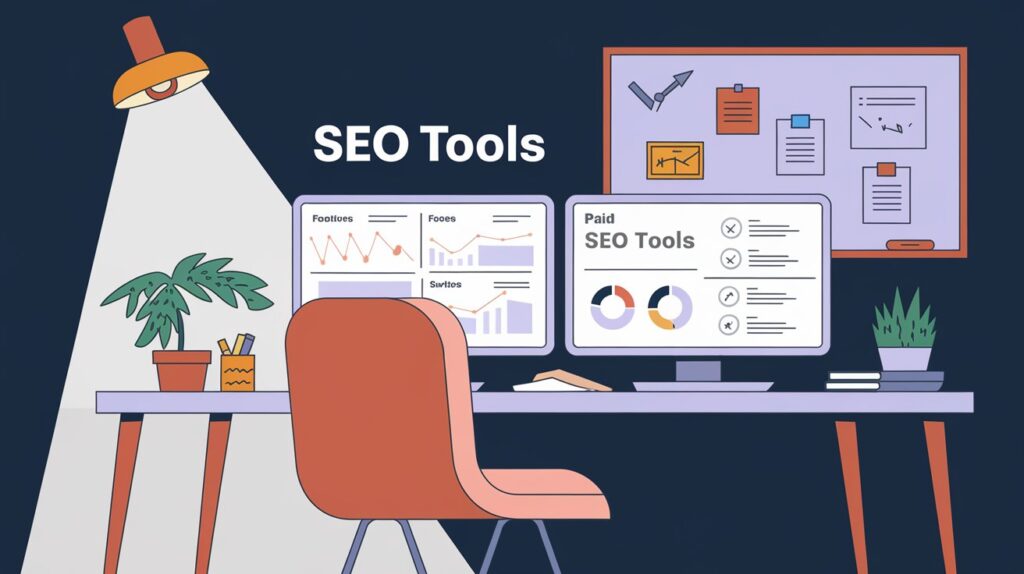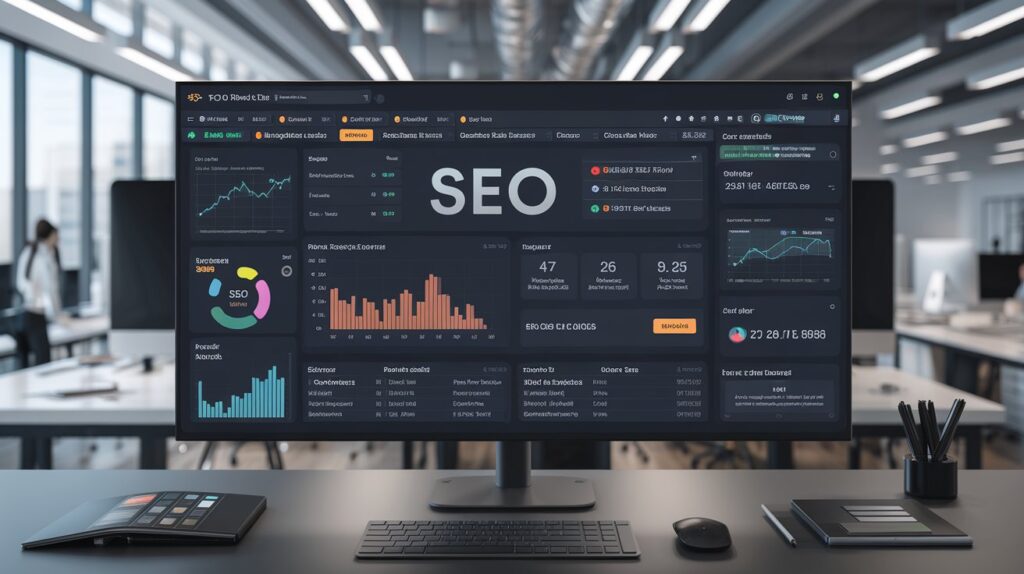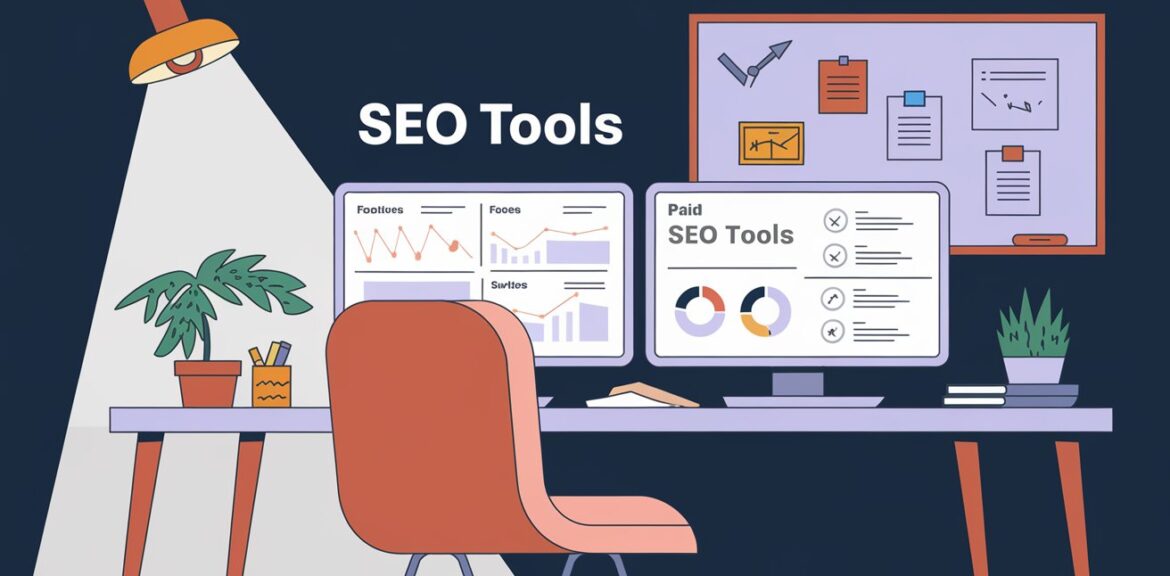SEO tools are software that helps you optimize your website for search engines. SEO works as the backbone of online marketing since it attracts organic traffic to your website. And how do you go about measuring the effectiveness of all the tools one should use for obtaining the best SEO results? This article seeks to summarize the best free and paid SEO Tools available to assist website optimization in ranking. Be you a novice or an expert in the field of SEO, there is a tool at your service.

What Are SEO Tools?
Well, SEO Tools basically are the software solutions which can be adopted for helping the website owners, marketers, and SEO experts to optimize their websites for a particular search engine such as Google. The relevant information from such tools allows a user to improve several aspects of a website, and finally helps that to rank better in the search engine result pages (SERPs).
Types of SEO Tools:
- Keyword Research Tools:
- Purpose: This serves for finding the relevant keywords applicable to your site content linking search volume, competition, and user intent.
- How It Should Help: Having understood the keywords prospective customers are entering to get relevant information, you can adjust website content to meet these requirements expecting more visits from the search engines.
- Example Tools: Google Keywords Planning, SEMrush, Ahrefs, Ubersuggest.
- On-Page SEO Tools:
- Purpose: Analyze the on-site features of a website including meta-tags, headings, URLs, and contents.
- How It Should Help: On-page SEO tools ensure that the contents are structured well enough for the search engines such as to verify the correctness of page titles, description, and keywords optimization for both search engines and users.
- Example Tools: Yoast SEO (for WordPress), Moz Pro, Screaming Frog SEO Spider.
- Link Building Tools:
- Purpose: To find backlinking possibilities (link from other sites to yours) and check how healthy your backlink profile is.
- How It Helps: Backlinks are a huge ranking technique determining in search engines. It helps you in finding a high-quality site where you can easily get backlinks to boost your site’s authority and, in turn, your search engine ranking.
- Example Tools: Ahrefs, Majestic, BuzzSumo.
- Technical SEO Tools:
- Purpose: The application of the technical evaluation of the aspects such as site speed, mobile compatibility, indexing, crawlability, and site structure.
- How It Helps: Technical SEO tools provide the detection of issues that can hinder the performance of your website to search engines, like slow loading times, broken links, or an improper site structure. Users are able to fix the technical issues in the backend of the website to enhance their experience and boost rankings.
- Example Tools: Google Search Console, PageSpeed Insights, GTmetrix.
- Content Optimization Tools:
- Purpose: The purpose of these tools is to provide improvement for the content relevance and quality of it according to SEO best practices.
- How it Helps: These tools are great in optimizing your content for reading, keyword usage, and the total SEO merit. They assure that your content is a high quality, relevant one likely to perform decently in search engines.
- Example Tools: Grammarly (readability), Clearscope, Surfer SEO.
Best Free SEO Tools
1. Google Search Console
Google Search Console is a free tool that Google has provided to webmasters to manage and monitor their sites in Google’s search results. It talks about the performance of your sites in search results; highlights indexing issues, and keyword performance.
Key Features:
- Track keyword rankings and impressions.
- Monitor errors and crawling issues on your site.
- Submit sitemaps/URLs for indexing.
Why Use It? It is essential for every website that aspires to grow its search ranking. Very user-friendly and insightful into how Google sees your site.
2. Ubersuggest
Ubersuggest, a free keyword research, backlink data, and site audit tool was created by Neil Patel. It enables you to know which keywords are bringing you traffic and which ones you should aim at.
Key Features:
- Keyword suggestions and search volume data.
- Backlink analysis.
- Site audit for SEO issues.
Why Use It? A great free beginner tool. Simple interface with good data for improving SEO.
3. Yoast SEO (Free Version)
Yoast SEO is one of the plugins widely used by WordPress for on-page SEO. The plugin’s free version comes with the basic availability of features like optimizing keywords, reading analysis, customization of meta tags, and many other things.
Key Features:
- Optimum titles and meta kw descriptions.
- Keyword density analysis.
- Readability checks for your content.
Why Use It? For WordPress users, Yoast SEO is for people wanting to optimize their work immediately and well.
4. Answer the Public
Answer the Public is a tool without a cost which allows you to know what questions and phrases people are searching with that particular keyword. This is very nice for content-related writing with topics that can bring traffic to the site.
Key Features:
- Visual keyword research tool.
- Questions, prepositions, and comparisons related to your keyword.
- Help you find long-tail keywords.
Why Use It? Answer the Public has much more potential about what it can give you in search intent, and it can then make it easier to answer your audience’s questions or, rather, make content targeted at your audience’s questions.

Best Paid SEO Tools
1. Ahrefs
Ahrefs is one of the powerful SEO tools. While it is known best for its backlink analysis functionality, it also carries additional features, including keyword research, site audits, and competition analysis.
Key Features:
- Backlink analysis.
- Keyword research and rank tracking.
- Site audit tools.
Why Use It? Given its nature of providing extensive information about the web, Ahrefs tool is appropriate for advanced SEO professionals interested in getting more in-depth analysis.
2. SEMrush
SEMrush is an all-in-one SEO tool that offers everything related to keyword research, backlink analysis, competitive analysis, and much more. It’s among the best for people professionals who want to use it for a lot of angles for SEO.
Key Features:
- Thorough keyword research.
- Competitor analysis and domain comparison.
- Backlink analysis.
Why Use It? This is because SEMrush provides a fully integrated suite of tools with regard to SEO; therefore, it caters to businesses that need to analyze all aspects for monitoring and optimization of their SEO.
3. Moz Pro
Moz Pro is another total SEO tool catering to keyword research, website audits, and tracking backlinks. Very straightforward but very insightful into your performance.
Key Features:
- Keyword research and suggestions.
- Backlink analysis.
- Rank tracking and site audits.
Why Use It? Moz Pro is ideal for businesses looking for a user-friendly, although not very comprehensive tool, for SEO purposes.
4. SpyFu
SpyFu is a paid SEO tool for competitive analysis. It will help you track your rivals’ keywords, backlinks, and advertisements to overcome them.
Key Features:
- Competitor keyword research.
- Ad History and Outlays.
- Backlink data.
Why Use It? SpyFu is a winning tool for businesses that want competitive analysis to really outsmart their competitors with search results.
5. Majestic SEO
Majestic SEO is an experienced backlink analysis tool that digs deeper into the measure of quality that is provided to your backlinks. This comes especially helpful in establishing link-building.
Key Features:
- Comprehensively analyzing backlinks.
- Link building incentives.
- Old data and reports.
Why Use It? Majestic SEO is most fitting for a business that targets a solid backlink profile and corresponding improvements in domain authority.
6. Screaming Frog SEO Spider
A great crawling software for the website is Screaming Frog, since it will discover many onsite errors like broken links, duplicate content, and missing quality attributes.
Key Features:
- Crawl and Audit Websites for Technical SEO Issues.
- Discover and eliminate broken links and redirections.
- Title and review pages, meta descriptions, among many other things.
Why Use It? Screaming Frog is part of the tools that every technical SEO expert will need to do a complete analysis to understand how the target website has been programmed to work.

SEO Tools Free vs. Paid: Which One is Right for You?
However, then it depends on how much experience you have acquired, the size of the website, and specific search engine optimization needs when deciding between free versus premium search engine optimization tools. Both types have their advantages but depend on what results you want to achieve.
Free SEO Tools: Good for Beginners
- What They Offer: Free tool provides on basic essential features for the following basic SEO tasks:
- Keyword Research: Helps find relevant keywords for your website.
- On-Page SEO Analysis: Helps to optimize elements of pages such as titles, meta-descriptions, and headings.
- Backlink Checker: Provides details about the number and quality of backlinks to your site.
- Advantages
- Cost Effective: Free as there is barely any financial investment involved, thus it is an amazing choice for beginners with small websites and for users with low budgets.
- User Friendly: Free tools mostly come up with a lot easier interface, therefore very convenient for one’s first encounter with SEO.
- Limitations:
- Limited Features: Mostly, free tools lack advanced functionality like in-depth competitor analysis or detailed site audits.
- Data Restrictions: Most of the free tools have their own restrictions about how many queries you can make or how much data you can access, which places limitations in the case of a larger website or in-depth research.
- Basic Insights: Analysis given by free tools is usually more basic and is sufficient for small-scale or beginner-level SEO, but not for more complex needs.
- Perfect For: Beginners, small business owners, hobby bloggers, or people dabbling in SEO without seriously investing.
Paid SEO Tools: For More Proficient SEO
- What They Offer: Typically, paid tools are known to provide more than just the following:
- Competitor Analysis: By analyzing competitors’ SEO methods, chances of outpacing them can be discovered.
- Advanced Keyword Research: More intricate keyword metrics such as keyword difficulty, search volume, and others associated with keywords can be.
- In-Depth Audits,: These site audits in the site are comprehensive and holistic, where it analyzes the SEO health as a whole and finds technical problems, content gaps, and optimization chances.
- Data Reporting & Analytics: Provides more detail and customizable reports of data, which the need becomes a salient feature of big-scale SEO needs.
- Advantages:
- Detailed Analysis: Not to mention, paid tools furnished extra rich features with a much deeper mean of your own SEO analyses.
- More Accurate: More precise and also world-class data obtained to fine-tune your strategy and help you to get into data-driven decisions.
- Scalability: Such tools accommodate largeness in weight inasmuch as they cater to large-sized websites, complicated SEO needs of companies, and agencies dealing with a number of clients or websites.
- Limitations:
- Cost: Paid tools make the budget-aided prospect moderate to high subscription fees based on the covered features and size.
- Complexity: Adding more features makes them complex and might require some practice or experience before its effective usage-the case for most paid tools.
- Perfect For: Businesses, agencies, or professionals needing advanced functionalities and large-scale analysis and comprehensive reports. Paid tools will also prove handy at SEO across multiple websites or competitors that necessitate divided, actionable insights into performance.
Which One is Right for You?
- Start with Free Tools: If you’re new to SEO, have a small site, or are on a budget, begin with free tools. It is also a good idea to start using free tools in order to understand the basic principles of SEO without the initial cost.
- Consider Paid Tools: Paid Tools Considering the expansion of your website, the increased complexity of the SEO needs, or when you’re looking for more insight, paid tools will be an excellent option. These are really for businesses that want professional strategies and advanced analysis in order to scale their findings.
People Also Ask:
1. What are the best free SEO tools?
- Google Search Console, Ubersuggest, Yoast SEO, and Answer the Public are excellent free SEO tools.
2. Which SEO tool is the best for keyword research?
- Ahrefs, SEMrush, and Moz Pro are among the best for keyword research.
3. Are free SEO tools worth using?
- Yes, free SEO tools are great for beginners and smaller websites, but for advanced features, paid tools offer more comprehensive solutions.

Conclusion
In conclusion, the right SEO tools, whether free or paid, can have a huge impact on the performance of an organization’s website. Most free tools, such as Google Search Console and Ubersuggest, are adequate for the beginner. Paid tools, such as Ahrefs and SEMrush, offer more minute insights for advanced SEO Tools strategies. Choose the right one according to your individual goals and remember that a combination of both will go even further toward achieving the best for your SEO efforts.
Make the most of your time and effort by using the best SEO Tools Free and Paid. It will enhance the optimization of your website, increase traffic to your site, and improve your rankings in search engines. So, start using it today and observe how it pays for your SEO efforts.















